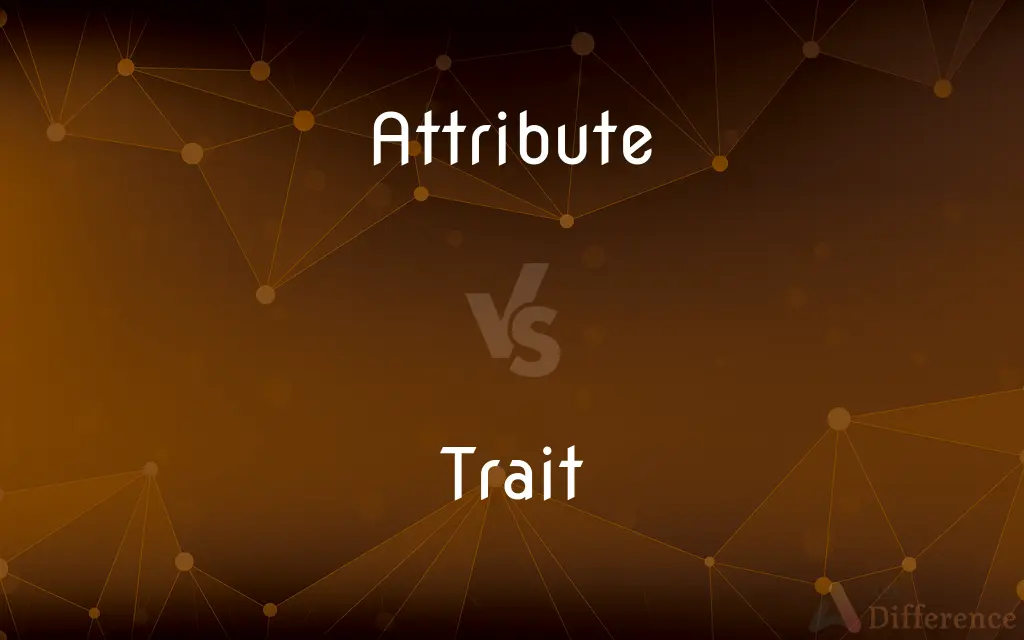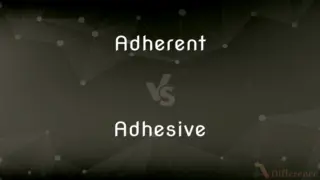Attribute vs. Trait — What's the Difference?
By Tayyaba Rehman — Updated on November 3, 2023
An attribute is a quality or feature of a person or thing; a trait is a distinguishing characteristic, often innate, of an individual.

Difference Between Attribute and Trait
Table of Contents
ADVERTISEMENT
Key Differences
An attribute refers broadly to any quality or feature of a person, place, thing, or idea. It is used to describe aspects that may change or be bestowed. A trait, however, often refers to inherent qualities or characteristics that define an individual, typically in a biological or personality context.
Attributes can be physical or abstract and are not limited to personal characteristics; they can apply to objects, ideas, and scenarios. Traits are more often used to discuss elements of a person's temperament or genetic characteristics, emphasizing the stability over time.
Attributes are used in various fields, from computing, where they may define properties of files, to product descriptions. Traits tend to be used in discussions of psychology, biology, and the social sciences, focusing on living beings and their behaviors or features.
The application of attributes can extend to temporary or situational features, such as attributes of a role or job position. Traits are typically considered consistent and enduring aspects of a person's nature, like a trait for honesty or blue eyes.
In general, while both attributes and traits describe features or qualities, attributes are more versatile and transient, and traits are more intrinsic and stable.
ADVERTISEMENT
Comparison Chart
Definition
A quality or feature of a thing or person.
A distinguishing characteristic, often innate.
Context of Use
Broad, including non-living things and concepts.
Mainly in describing living beings.
Stability
Can be temporary or changeable.
Generally stable and enduring.
Scope
Both innate and acquired features.
Primarily innate features.
Fields of Common Usage
General, business, technology, attributes in programming.
Psychology, genetics, personal characteristics.
Compare with Definitions
Attribute
An object closely associated with or belonging to a specific person, thing, or deity.
The lightning bolt is an attribute of the Greek god Zeus.
Trait
A feature of someone's personal nature.
Patience is a trait that he obviously lacks.
Attribute
A symbol of office, power, or authority.
The scales are an attribute of Lady Justice.
Trait
A condition that distinguishes one person from another.
A trait unique to humans is their ability to use complex language.
Attribute
To regard something as being caused by a person or thing.
She attributed her success to hard work and dedication.
Trait
A genetically determined characteristic.
Eye color is a trait passed down from parents to their children.
Attribute
A property or descriptive feature of a class in programming.
In the database, each customer's name is stored as an attribute.
Trait
An identifiable characteristic of a plant or animal.
The trait of nocturnal vision is common among many predators.
Attribute
To regard as arising from a particular cause or source; ascribe
Attributed their failure to a lack of preparation.
Trait
A distinguishing quality or characteristic, typically belonging to a person.
Her kindness is her most notable trait.
Attribute
To regard (a work, for example) as belonging to or produced by a specified agent, place, or time
Attributed the painting to Titian.
Attributed the vase to 18th-century Japan.
Trait
A distinguishing quality or characteristic, typically one belonging to a person
The traditionally British trait of self-denigration
Attribute
A quality or characteristic inherent in or ascribed to someone or something.
Trait
A distinguishing feature, as of a person's character.
Attribute
An object associated with and serving to identify a character, personage, or office
Lightning bolts are an attribute of Zeus.
Trait
A morphological, physiological, or behavioral feature of an organism.
Attribute
(Grammar) A word or phrase syntactically subordinate to another word or phrase that it modifies; for example, my sister's and brown in my sister's brown dog.
Trait
(Archaic) A short line or mark made with a writing or drawing implement.
Attribute
A characteristic or quality of a thing.
His finest attribute is his kindness.
Trait
An identifying characteristic, habit or trend.
The number one personality trait I hate is hypocrisy. Why can't you be consistent!?
Attribute
An object that is considered typical of someone or some function, in particular as an artistic convention.
The eagle and the bolt of lightning are attributes of Jove.
Trait
(object-oriented) An uninstantiable collection of methods that provides functionality to a class by using the class’s own interface.
Traits are somewhat between an interface and a mixin.
Attribute
(grammar) A word that qualifies a noun.
Trait
A stroke; a touch.
By this single trait Homer makes an essential difference between the Iliad and Odyssey.
Attribute
(logic) That which is predicated or affirmed of a subject; a predicate; an accident.
Trait
A distinguishing or marked feature; a peculiarity; as, a trait of character.
Attribute
An option or setting belonging to some object.
This packet has its coherency attribute set to zero.
A file with the read-only attribute set cannot be overwritten.
Trait
A distinguishing feature of your personal nature
Attribute
(programming) A semantic item with which a method or other code element may be decorated.
Properties can be marked as obsolete with an attribute, which will cause the compiler to generate a warning if they are used.
Attribute
In a Nutshell|page=536
Attribute
A numeric value representing the colours of part of the screen display.
Attribute
To ascribe (something) to a given cause, reason etc.
Attribute
To associate ownership or authorship of (something) to someone.
This poem is attributed to Browning.
Attribute
To ascribe; to consider (something) as due or appropriate (to); to refer, as an effect to a cause; to impute; to assign; to consider as belonging (to).
We attribute nothing to God that hath any repugnancy or contradiction in it.
The merit of service is seldom attributed to the true and exact performer.
Attribute
That which is attributed; a quality which is considered as belonging to, or inherent in, a person or thing; an essential or necessary property or characteristic.
But mercy is above this sceptered away; . . .It is an attribute to God himself.
Attribute
Reputation.
Attribute
A conventional symbol of office, character, or identity, added to any particular figure; as, a club is the attribute of Hercules.
Attribute
Quality, etc., denoted by an attributive; an attributive adjunct or adjective.
Attribute
A construct whereby objects or individuals can be distinguished;
Self-confidence is not an endearing property
Attribute
An abstraction belonging to or characteristic of an entity
Attribute
Attribute or credit to;
We attributed this quotation to Shakespeare
People impute great cleverness to cats
Attribute
Decide as to where something belongs in a scheme;
The biologist assigned the mushroom to the proper class
Attribute
A quality or feature regarded as a characteristic of something.
Flexibility is an important attribute for a gymnast.
Common Curiosities
What makes a trait different from an attribute?
A trait is an inherent, often heritable, characteristic of an individual, while an attribute can be more general and changeable.
Are attributes innate?
Attributes can be either innate or acquired.
Are attributes always positive?
No, attributes can be positive, neutral, or negative.
Can objects have traits?
Typically, "trait" refers to characteristics of living beings, not objects.
Is an attribute similar to a skill?
An attribute can refer to a skill if it's a defining feature of a person or thing.
Is 'intelligence' an attribute or a trait?
Intelligence can be considered both an attribute and a trait, depending on the context.
Do attributes relate to personal achievements?
Attributes can relate to achievements if they are qualities that contribute to success.
Can a personality disorder be considered a trait?
It's more accurate to describe it as a condition; however, certain underlying behaviors can be traits.
What exactly is an attribute?
An attribute is a quality or feature that is ascribed to someone or something.
Can a trait be changed?
Traits are often considered stable and enduring, though some behavioral traits can change with effort and time.
Can animals have attributes?
Yes, animals can have attributes such as speed or agility.
Can organizations have attributes?
Yes, organizations can have attributes like culture or reputation.
Are all traits hereditary?
Not all traits are hereditary; some are developed through personal experience.
Are physical characteristics traits?
Yes, physical characteristics are commonly referred to as traits.
Is a trait the same as a habit?
No, a habit is a regular practice or tendency, while a trait is a distinguishing characteristic.
Share Your Discovery

Previous Comparison
Corresponding vs. Relevant
Next Comparison
Adherent vs. AdhesiveAuthor Spotlight
Written by
Tayyaba RehmanTayyaba Rehman is a distinguished writer, currently serving as a primary contributor to askdifference.com. As a researcher in semantics and etymology, Tayyaba's passion for the complexity of languages and their distinctions has found a perfect home on the platform. Tayyaba delves into the intricacies of language, distinguishing between commonly confused words and phrases, thereby providing clarity for readers worldwide.
















































